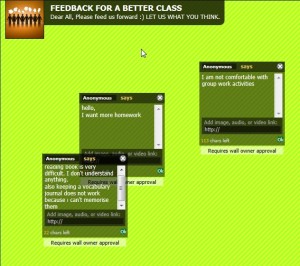Students have a great role in maintaining quality and enhancing learning due to their engagement in processes of internal
quality assurance. Students’ evaluation may bring about many potential benefits including opportunities to gather students’ feedback on a non-face-to-face basis without fear of sanctions, to help educators understand the concept of institutional educational quality, to encourage teachers to identify areas of improvement and raise standard of teaching quality, to provide areas of research in teaching, to maintain a less intrusive form of classroom appraisal and to provide a broader and more objective base of evaluation in comparison to one which is undertaken by the department chairperson/ director. (Ting, 1998). Therefore it’s argued that students have great impact in shaping improvement.
How?
Little and Williams (2010) focus on students’ contribution in the form of questionnaires and surveys and representation on
staff/student committees at course and departmental levels. Focus group meetings and interviews can also be held. One outcome of the research into student evaluation was the development of the Student Evaluation of Educational Quality (SEEQ). (Marsh et al, 1997)
Examples
At my in my institution we have formative and summative student feedback that students fill in on-line anonymously. I sometimes
ask students write me a note, or prepare a poster with post-it-s to elicit student feedback.
Some Concerns about Student Feedback
On the other hands there are some reservations towards student ratings on grounds of uncertainty as to how students rate teaching performance and how ratings apply in ‘tenure and promotion decisions’. In other words, at times we may think that students’ evaluation is not reliable and evaluation is used for judgmental purposes (the assessment of teachers) not for developmental purposes.
Researchers also remark cultural differences that may come into play when students are asked to give feedback. Ting (1998) underlines the reflection of educational culture on students’ rating, focusing on changing concepts which also relate to
Turkish educational context such as paternalistic authority, unconditional respect on teachers which assumes that students are not expected to criticize their teachers. However many educators think that teachers may have confidence in students’ rating of teaching performance if there is a clear understanding of its meaning. In my opinion this means learner training in giving feedback.
What does research say about reliability of student evaluation?
Some studies (Ware & Williams, 1979, 1980) suggest that students prioritize entertainment and generosity of given grades while judging teaching performance and rating their learning experience.
However many studies conclude that sources of such biases do not pose threats to the
overall validity of student ratings (Costin et al 1971; Marsh 1980). I really believe that getting feedback from students is beneficial (and I often try to do both formally and informally) but there are some points that should be planned carefully.
Are there formal feedback mechanisms at your school?
How do you get students feedback? Do you think they help us? What do YOU think about getting feedback from the students? Please share…
(Cross posted at Blogathon 2012)
References:
Little, B. and Williams, R. (2010). Students’ Roles in Maintaining Quality and in Enhancing Learning: Is There a Tension?. Quality in Higher Education, 16: 2, 115 -127.
Ting, K. (1998). Measuring teaching quality in Hong Kong’s higher education: Reliability and validity of student ratings.
Costin,F., Greenough, W.T., & Menges, R.J. (1971), “Student ratings of college teaching: Reliability, validity, and usefulness,” Review of Educational Research, 41(5), pp. 511-535
Marsh, H.W. , Overall J.U & Kessler, S.P. (1979) Journal of Educational Psychology, 71 (2),149-160.
Marsh, H.W. (1980),“Research on students’ evaluations of teaching effectiveness,” Instructional Evaluation, 4, 5-13.
Ting, K. (1998). Measuring teaching quality in Hong Kong’s higher education: Reliability and validity of student ratings. http://teaching.polyu.edu.hk/datafiles/R51.pdf
Ware, J.E. & Williams, R.G. (1979), “Seeing through the Dr. Fox effect: A response to Frey,” Instructional Evaluation, 3, 6-10.
Ware, J.E. & Williams, R.G. (1980), “A reanalysis of the Doctor Fox experiments,”Instructional Evaluation, 4, 15-18.




Recent Comments